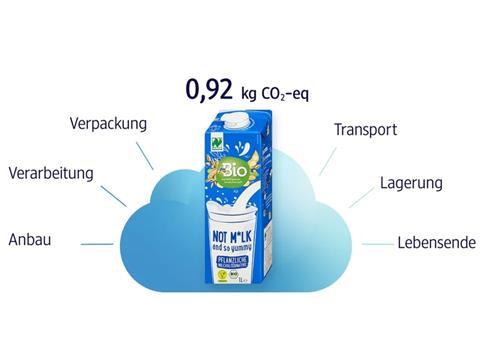
German retail chain DM has announced it will providing a CO2 equivalent value for 30 of its food products in partnership with tech company inoqo, with more products due to follow.
DM says the CO2 equivalent indicates how much greenhouse gas is produced during a product’s production, transport and disposal. The company plans to display the value for certain food products underneath ‘Product Information’.
The retailer states that the calculations consider all greenhouse gas emissions along the entire value chain, from agricultural production through processing, packaging, transport and storage to cradle-to-grave disposal. Domestic use, such as cooking or refrigeration, is not taken into account. The basis is inoqo’s Impact Database.
Each product is evaluated individually. Emissions are stated per unit sold and per kg, aiming to provide a ‘useful and transparent’ assessment of climate impact for everyday use.
However, the companies note that even if providers calculate CO2 equivalents according to ISO 14040/44 or the GHG Protocol, these results are not directly comparable. Differences in methodology, system boundaries and data sources can lead to differing values.
DM adds that while the full extent of a product’s environmental impact cannot be determined by assuming general emission values for product categories, relevant primary data such as recipes, the origin of ingredients or packaging information were included where available.
Back in May, SIG announced the commercial launch of its SIG Terra Alu-free + Full barrier for multi-serve aseptic cartons, said to reduce carbon footprint by up to 61% and be aluminium-layer-free. Ready to be provided at scale to customers worldwide, the company stated the packaging material offers the same full barrier protection as standard aseptic cartons and the same shelf life of up to 12 months.
More recently, Patrón Tequila unveiled its redesigned tequila bottles with 8% weight reduction, seeking to lower its carbon footprint. The new bottle was designed in collaboration with Servaire & Co, and applies to the company’s core portfolio of Silver, Reposado, Añejo, and Extra Añejo drinks.
If you liked this story, you might also enjoy:
The ultimate guide to the Packaging and Packaging Waste Regulation in 2025
How are the top brands progressing on packaging sustainability?
Everything you need to know about global packaging sustainability regulation in 2025
The key to increasing the use of reusable packaging in supermarkets














No comments yet